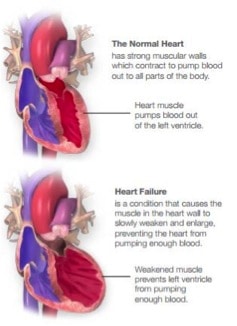What is heart failure?

If you have heart failure, you’re not alone. About 6 million Americans are currently living with it. In fact, it’s one of the most common reasons people age 65 and older go into the hospital. It can take years for heart failure to develop. Heart failure symptoms usually develop over time as your heart becomes weaker and less able to pump blood that your body needs. Heart failure usually results in an enlarged heart (left ventricle). Heart failure is a serious long-term (chronic) condition. But you can live a full, active life with the right medical treatment and attention to your lifestyle.
Does your heart stop?
When you have heart failure, it doesn’t mean that your heart has stopped beating. It means that your heart isn’t pumping enough blood. The heart keeps working, but the body’s need for blood and oxygen isn’t being met. Heart failure can get worse if it’s not treated. The best thing you can do is follow your health care professional’s instructions and make any needed changes in diet, physical activity and lifestyle. This will help you have the best possible quality of life.
Signs of heart failure
- Shortness of breath, especially when lying down
- Tired, run-down feeling (fatigue)
- Coughing or wheezing, especially when you exercise or lie down
- Swelling in feel, ankles and legs
- Weight gain from fluid buildup
- Confusion or not thinking clearly
- Dizziness or lightheadedness
What can happen?
If your heart does not pump enough blood, blood can back up in your veins and cause fluid to build up in the feet, ankles and legs. This is called “edema.” Fluid can also build up in your lungs, causing “pulmonary edema.” When this occurs, the body doesn’t get enough blood, food and oxygen.
What causes heart failure?
The two most common causes of heart failure in the U.S. are high blood pressure and coronary artery disease (CAD). CAD occurs when arteries that supply blood to the heart muscle become narrowed by buildups of fatty deposits called plaque. Other common risk factors that lead to heart failure include:
- Being overweight or obese
- Type 2 diabetes
- Smoking
- High cholesterol
- Metabolic syndrome
- Sleep apnea
- Alcohol or drug abuse
Other conditions that can cause heart failure include:
- Past heart attack that leaves damage to heart muscle
- Heart defects present since birth
- Heart valve disease
- Diseases of the heart muscle
- Infection of the heart and/or heart valves
- Abnormal heart rhythm (arrythmias)
Heart failure treatments
Treatment for heart failure can include medication to strengthen the heart or water pills to help get rid of excess fluids. A low sodium-diet may be recommended, and supplemental oxygen can be used at home to support the heart. Certain lifestyle changes like diet and exercise can also be recommended, as well as surgery or cardiac devices.
What can I do to manage my heart failure?
- Follow your health care professional’s advice
- Quit smoking, if you smoke
- Take your medications exactly as prescribed
- Weight yourself daily to watch for sudden weight gain
- Track daily fluid intake
- Monitor blood pressure daily
- Lose or maintain weight based on doctor’s recommendations
- Avoid or limit alcohol and caffeine
- Follow a heart-health diet
- Reduce your sodium intake
- Be physically active
- Get adequate rest
This information was compiled by the American Heart Association. To learn more about treatments available at The Advanced Heart Failure Center at Oklahoma Heart Institute, visit this link.

